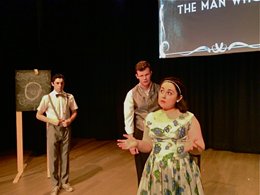Hot on the heels of its lively revival of Raymond Scannell’s Breathing Water, Chatterbox has come to the 2012 Pick’n’Mix Festival primed and ready for a run at the Edinburgh Fringe in August. Pick’n’Mix is the brainchild of Belfast’s Old Museum Arts Centre (OMAC), where it was set up in 2007 to be an annual showcase of new work. As the OMAC has morphed into the spanking new, all-singing, all-dancing multi-media arts space The MAC, so Pick’n’Mix has grown up, put on its gladrags and gone out on the town.
For The Man Who, Queen’s University Belfast graduate and BBC award-winning writer Seamus Collins has joined forces with this enterprising young company, whose members are fellow alumni of QUB’s drama department, to produce this slick, sharply observed little comedy, whose presentation has a distinctly nostalgic feel about it.
The Man Who is as much about the man who invented the wheel as about the man who did not invent the wheel. Its storyline reaches back into the mists of time, when invention was becoming the in-thing, to the days when few elements of everyday life had been formally defined and so many of the things we take for granted were but a twinkle in the eye of a handful of eccentrically minded individuals.
Our enthusiastic guide and narrator is the academic Dr. Benedict Bloom (Chris McCurry), who steers us back to a pivotal early relationship between a master inventor and his eager young apprentice, both intent on outdoing each other as they launch on the world all manner of audacious investigations and experiments.
Director Eilise McNicholas trains a coolly humorous eye onto this Victorian music hall, silent movie-flavoured presentation, in which nothing is quite as it initially appears. We are invited to imagine that in the time that is in it, there was no concept of names for common nouns. Thus we encounter The Man and The Younger Man. It should be easy to tell who is the master and who the apprentice. The Man, dashingly played by Seamus O’Hara, is quite the dandy in his brocade jacket and silk waistcoat, while The Younger Man sees Thomas Finnegan innocently togged out in schoolboy shorts, braces, bow tie and scarlet socks. Given that the tale is set in a period “... shortly after the dawn of time ...” they both register as rather modern everyman figures, but in amongst the fun and eyebrow raising of the narrative, we can let that one go.
The Man is all flash and flourish, perennially immersed in wild flights of fancy, out of which a welter of strange objects tumble. Then he unveils his piece de resistance, illustrating it on a blackboard as something resembling a block of cheese covered with a mass of disconnected, scribbly wires. At random, he pronounces its name: “The Weel.”
 The Younger Man steps forward and hesitantly adds his own contribution. It is merely a humble circle but, to the evident annoyance of The Man, it appears to contain infinitely more potential than his own masterpiece. Neither, however, is able to come up with a suitable name for this harmless item until the arrival of Hayley Russell’s prissy little Woman, who takes one look at it and promptly adds the letter H. At which point, the wheel is invented – but by whom?
The Younger Man steps forward and hesitantly adds his own contribution. It is merely a humble circle but, to the evident annoyance of The Man, it appears to contain infinitely more potential than his own masterpiece. Neither, however, is able to come up with a suitable name for this harmless item until the arrival of Hayley Russell’s prissy little Woman, who takes one look at it and promptly adds the letter H. At which point, the wheel is invented – but by whom?
The plotline skips merrily through a tangled web of shifting relationships – The Man and The Woman, The Younger Man and The Woman, The Man and The Younger Man – revealing tentative explorations of sexual equality, feminist principals and the need to identify people and objects. Thus The Woman becomes Matthew and The Younger Man Brendan. Why? Why not? And, in parallel, the rivalry between the two inventors intensifies as it becomes blindingly evident which of them is the true inventor and whose name will make it into the history books.
One by one, familiar figures pop up on screen – Shakespeare, Leonardo Da Vinci, the inventor of instant noodles – to testify how the man who invented the wheel has influenced their greatest works.
If the whole concept is slightly inconsequential, its cryptic, tangential comedy is entirely diverting and positively lapped up by the two sell-out audiences, comprising people of all generations.
Jane Coyle is a Belfast-based freelance arts journalist, critic and screenwriter, who regularly contributes to The Irish Times, The Stage, Culture Northern Ireland and BBC Radio Ulster.